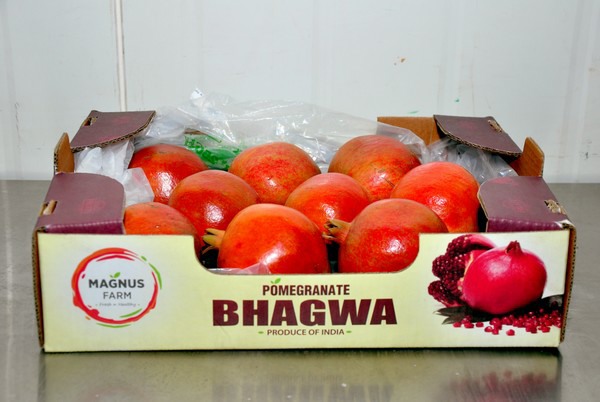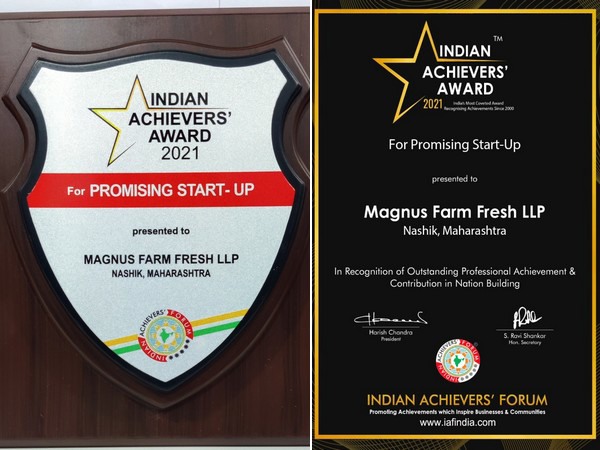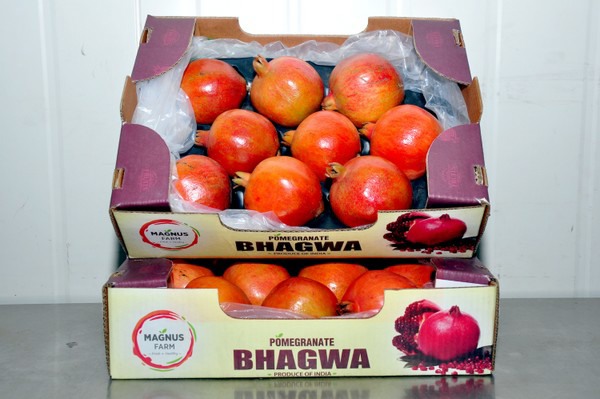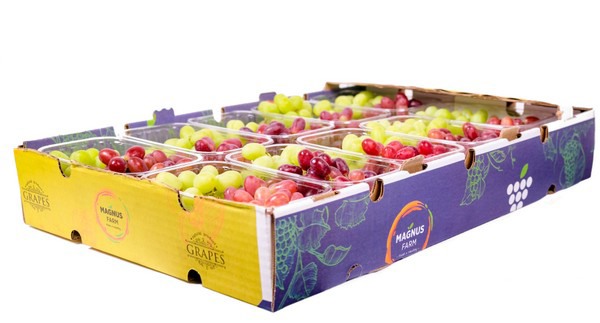The pomegranate and grape seasons are coming up in India. Export for the pomegranates is rather slow at the moment as larger sizes are not widely available at this time. However, according to one exporter from India the competition could have issues with quality and production, providing a gap for the Indian pomegranates. At the same time the costs of sea freight are so high that it’s hard to be competitive in the European market.

According to Girish Sarda, founder of Indian start up Magnus Farm Fresh, the harvest is currently shifting from the Nashik area to the Solapur region: “India is the only country who can supply pomegranates for nine to ten months per year. So for one or another production area, domestic and export harvest is always in progress. Now, this period of the year is the shifting of production area from Nashik to Solapur region of Maharashtra. The availability is currently in Solapur and the adjacent districts contribute to the major harvest for export, which starts from mid-November and lasts until the end of April.”
In terms of demand, Sarda states that there is an increase on the domestic market specifically, due to the start of the festival season. “There is always a market for Indian pomegranate in Asia and the Middle East. Just the export is slow at the moment, as availability of big sizes with quality produce has been a big concern for the last couple of months. However, domestic demand increased due to the start of the festival season. Growers prefer to sell their produce to the domestic or nearby export markets like Bangladesh and Nepal, as they buy smaller sized fruit. Other markets like Middle East and South East Asia prefer larger sized fruit with good quality.”

Turkey and Egypt could be major competitors for the Indian pomegranates, especially in the European market. Sarda thinks Egypt might struggle with production and quality this year: “When it comes to competition from other origins, especially comparing to Egypt and Turkey, India struggles to get large sizes and low prices. We heard Egypt is struggling with production and quality with 116 and Wonderful variety this year, their season should come to an end early compared to last season. We’re looking at Turkey to see how their season starts and until what date they will continue their exports, then we will start our export packing for Europe.”
“Magnus Farm has customers in all destinations around the world, from Asia, Canada, Europe to the Middle East and many more. Our strong customer base in all these market give us an advantage to supply and grow every year. Our Pomegranate growers are GGAP and GRASP certified and now planning for SPRING as well as RFA certifications as well, especially for our European and Canadian customers,” Sarda says. “We’re also pleased to announced that Magnus Farm Fresh India has received recognition from the Indian Achievers Forum for one of the ‘Promising Start-Up 2021’ in Agriculture Sector. This award is for working in the field of Agriculture for a company that is less than two years old and works in a sustainable way, for the betterment of growers and farm workers, while contributing to nation building.”

There are plenty of challenges for the pomegranate season, Sarda says. The price of moving produce from India to Europe via sea is costlier than ever, making it hard to be competitive in long transit markets: “The harvest for export from the Solapur region is yet to start, as prices are currently stable. If the monsoons have the same impact as last season, then it will be difficult to export this year as well. Another major concern is the sea freight, more specifically the availability of containers. At the moment the costs of getting sea freight to Rotterdam is about double compared to the same period last year. If sea freight will cost an additional €1 per box, then I don’t think any importer or consumer will prefer to buy into an Indian pomegranate program and they will continue with Turkey or switch to another product until Peru starts with their exports. Shipping lines should look into sustainable ways of doing business. It’s unfair that a single origin in the world is paying double freight compared to 2020.”
Next to pomegranates Magnus Farm is also preparing for the new grape season, for which Sarda states they’d like to expand in Asian and Middle Eastern markets. “Our grape season will also get going in a couple of months. It’s a little too early to estimate how volumes will be, but other than exporting to our traditional markets like Europe and Russia, we are looking forward to expand in the Asian and Middle Eastern market. Elongated White and Black Jumbo has performed well in China, these varieties have really good eating quality, Last season there was an increase in demand between February to April, which could give a good window for Indian grapes into these markets.”

The pandemic has resulted in both importers and exporters playing it as safe as possible: “Most of the Indian exporters have a traditional program with their supermarkets in Europe and the UK. Due to the pandemic situation for the last two seasons, both importer and exporter do not want to lose their existing setup just to try something new, resulting in each individual business to stick to the original plans rather than trying for new business opportunities. Our next target is to expand our own grapes production with new varieties. The long term plan and our initial discussion for land investment is at the final stage to start something in Nashik with around 75 ha in the first phase. I hope this new development could give us an advantage to stand ahead of our competition in the next three to five years.” Sarda concludes.
Girish Sarda
Magnus Farms
Tel: +919167479099
Email: [email protected]
www.magnusfarm.com
